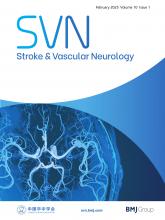Open Access
White matter hyperintensity progression is associated with incident probable dementia or mild cognitive impairment
Adam de Havenon, Kevin N Sheth, Sharon D Yeatts, Tanya N Turan, Shyam Prabhakaran
DOI: 10.1136/svn-2021-001357 Published 29 April 2022
Adam de Havenon
1Neurology, Yale University, New Haven, Connecticut, USA
Kevin N Sheth
1Neurology, Yale University, New Haven, Connecticut, USA
Sharon D Yeatts
2Public Health Sciences, MUSC, Charleston, South Carolina, USA
Tanya N Turan
3Neurology, MUSC, Charleston, South Carolina, USA
Shyam Prabhakaran
4Neurology, University of Chicago Pritzker School of Medicine, Chicago, Illinois, USA

No eLetters have been published for this article.
White matter hyperintensity progression is associated with incident probable dementia or mild cognitive impairment
Adam de Havenon, Kevin N Sheth, Sharon D Yeatts, Tanya N Turan, Shyam Prabhakaran
Stroke and Vascular Neurology Apr 2022, svn-2021-001357; DOI: 10.1136/svn-2021-001357

White matter hyperintensity progression is associated with incident probable dementia or mild cognitive impairment
Adam de Havenon, Kevin N Sheth, Sharon D Yeatts, Tanya N Turan, Shyam Prabhakaran
Stroke and Vascular Neurology Apr 2022, svn-2021-001357; DOI: 10.1136/svn-2021-001357





